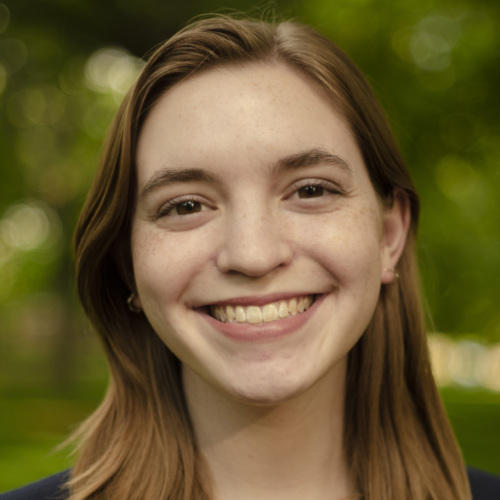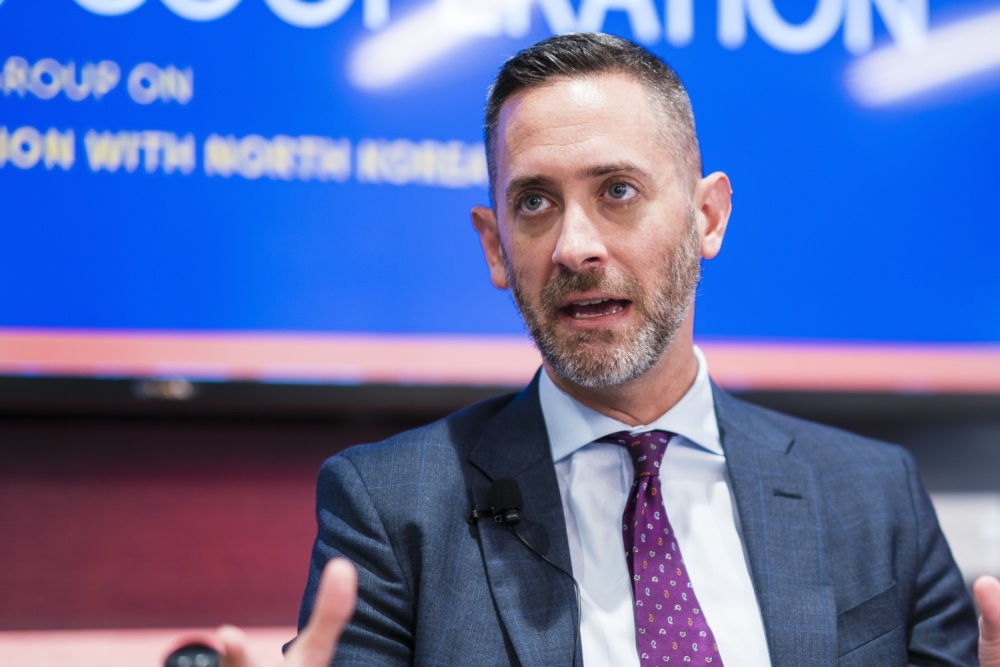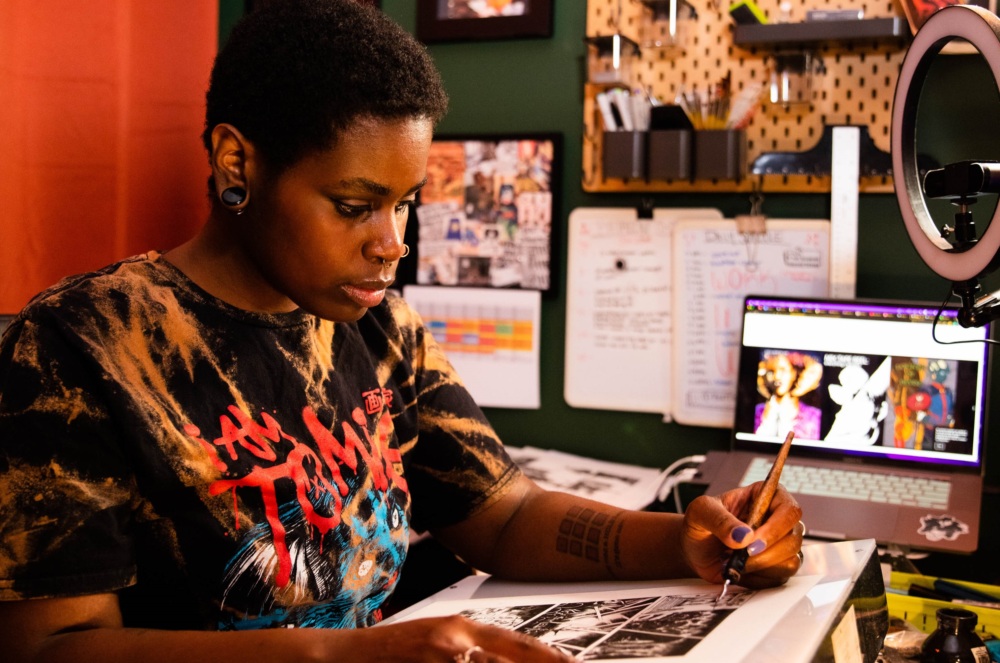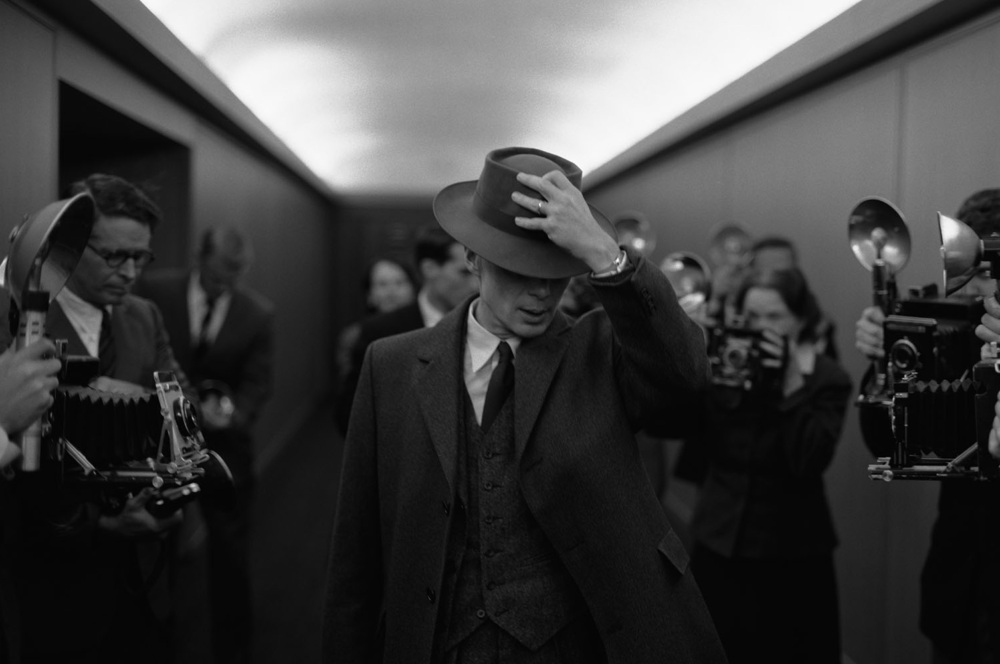
Maggie Thomas
Former Intern, NTI
Atomic Pulse
NTI is committed to highlighting and supporting LGBTQ+ voices in national security during Pride Month and beyond. Maggie Thomas, NTI’s communications intern, had the opportunity to speak with Richard Johnson, the Deputy Assistant Secretary of Defense for Nuclear and Countering Weapons of Mass Destruction Policy at the Department of Defense and former Senior Director for Fuel Cycle and Verification at NTI, about the importance of diversity in the national security space and his advice for young people interested in the field.
What got you interested in nuclear weapons policy?
To start, I would just note that my remarks are my own and do not reflect the views of the Department of Defense of the United States Government.
Nuclear weapons policy is very specialized sounding—it was not what I went to school to do. I went to school for international relations, thinking I would be an Asia expert and work on U.S.-China relations and U.S.-Indo-Pacific issues. But I took a course in graduate school taught by a nuclear physicist and a political scientist, and it opened up the whole field of nonproliferation, arms control, disarmament, and deterrence to me.
That same year, I was selected for the Presidential Management Fellowship, a program for recent graduate students to work in the federal government. There was a job available through that program at the State Department on North Korean nuclear issues. I had spent a lot of time studying East Asia, but the course I took on nuclear weapons gave me an extra bit of confidence to say, ‘Maybe I could apply for this job.’ And I have stayed in the nuclear and WMD field since then. So, it was really just one class that started it all!
That’s really awesome. Could you say a little bit about what you’re working on in your current role?
I currently serve as the Deputy Assistant Secretary of Defense for Nuclear and Countering Weapons of Mass Destruction Policy. It’s a very long title, but the job covers the gamut of issues for the Defense Department, looking at policies related to our nuclear deterrent and how we seek to prevent or, if necessary, respond to any WMD situation around the world. It’s the whole spectrum across nuclear, chemical, biological and radiological, from a policy perspective.
Going back to your career progression, it seems like you’ve worked mostly in the government, with a bit of time at NTI. How did your experience at a non-profit change the way you approach government work?
I really appreciate that I had time to be on the outside and get much more into the weeds, if you will, on specific topics. The great thing about working in the government is that I can directly shape policy on big issues. But it also means I have an array of things to worry about and am often trying to respond to the crisis of the day. So, it’s important that we have a diverse set of folks out there in the NGO, non-profit, and academia communities who are thinking deeply about these issues. We, in government, benefit from the work that folks on the outside do, because when a moment comes when the government needs to make a decision, some of that thinking has already been done.
International security is not a traditionally diverse field, but many groups have been working to change that. How have efforts to diversify the field affected your experience?
You’re right that the international security space, in particular the nuclear space, is not as diverse as it should be. It’s important that we do more to improve diversity across all categories—race, sexual orientation, gender, region, education.
Some people might say, ‘How does race or sexual orientation or gender have anything to do with nuclear weapons?’ Well, when you have people who all come from a similar background, it tends to bring about groupthink, which is never helpful when you’re trying to solve complex problems. We need to make sure that we have people in the room offering different perspectives and ways of organizing.
Increasing diversity is also just the right thing to do. I can say as a gay man I have felt welcome with my military and my civilian counterparts. But the national security community, and other military-adjacent communities, can be perceived as being very hypermasculine. There are ideas about who you need to be to work in this space that we need to overcome. I remember early in my career not wanting to talk to my colleagues about my personal life or what I’d done over the weekend because I thought I would reveal too much about me. I worried that they wouldn’t take me seriously if they knew that I was gay.
We have a lot of talent out there and if we are not looking to build a diverse national security community where everyone feels welcome, it’s actually bad for national security because we are not utilizing all the human capital that exists out there.
That’s a good point. What do you see as the biggest obstacles for inclusivity?
I’m pleased to say that I do see more diverse faces coming into this space than ever before. But there are lots of barriers to entry that make it more difficult for underrepresented populations.
I was talking about this with a colleague of mine who rightly pointed out that if I hadn’t been lucky to be at a very good school that happened to have professors who specialized in this field, I might never even have thought ‘Oh, I could do this kind of work even though I’m not a scientist or engineer.’ There’s real work to be done to reach out, whether it’s to historically Black colleges and universities or other minority-serving institutions. It’s incumbent upon the folks already in the field to do that outreach and say, ‘You can do this job. In fact, we want you to do this job. We welcome you into this community.’ What we are looking for are smart, dedicated people who can write and think and analyze and want to make this world a better place. The rest of the stuff you can learn.
It’s easier said than done. But we have to put the work in to make it happen.
Do you think that mentorship is part of the solution?
I do think mentorship is really important, and it is something that we have to remember is not a one-time sort of thing, right? When I agree to mentor somebody, I tell them I expect this to be a long-term relationship, in the sense that the best mentors and the best champions are the ones that you can call in six months, in a year, two years, five years to get their advice or feedback. We have to, as mentors, commit to the idea that mentorship is a long-term process. And especially as we’re trying to bring in new voices who wouldn’t normally think to enter this field, we have to commit to making ourselves available however we can to whomever we can.
This is ultimately a small field and we all have connections with each other. We have to make sure that we are building not just a network, but a community of folks, so that we can support the development of the next generation because, unfortunately, these issues are not going to be resolved in the near future.
If you had one piece of advice to give to young people, specifically in the LGBT+ community or other underrepresented communities, who are interested in getting into this field, what would that be?
It’s fine to be nervous, and it’s fine to know that you’re going to have challenges, but don’t be afraid that you can’t succeed in this field. I also want to acknowledge that I am a white, cisgendered man. While I have had some issues and challenges as an openly gay person, I know that those challenges are certainly not as large as if I were trans or a person of color. So, while not ignoring the potential challenges that one might face, if you’re interested in this community, I would say go for it and build a community that will be supportive for you, because it’s hard to do this alone. In fact, you really can’t do it alone. And luckily, we do have organizations now supporting underrepresented people in national security. There’s Out in National Security, Women of Color Advancing Peace and Security, Gender Champions in Nuclear Policy, and others.
And there are so many people who want to be supportive. I would say the hardest step is just to put yourself out there and say, ‘Okay, I want to try this.’ If you can find a way to reach out, whether it’s to someone on LinkedIn, or to a professor or someone who you think is inspiring, I bet you a lot of people who will come back and say, ‘Yes, I want to be helpful and give you some advice.’ So, it’s easier said than done, but you’ve got to start with that first step and just put yourself out there.
Thank you so much. That’s a really good answer. I’m going to take some of that advice for myself. To finish off, we wanted to get your opinion on a serious issue, one of the most pressing international events of this year. And that is: Eurovision 2022. What’s your hot take?
I have many hot takes on Eurovision 2022. First of all, I have to say Ukraine is obviously a very deserving winner, not just because it was certainly the emotional favorite, but that song is really good! Any song that includes a beatboxing flute sort of backbeat is going to get my vote.
I think the other big takeaway was the U.K. coming in second, which is a huge change because it came in last for the last couple of rounds. Now they’re going to actually get to host Eurovision, kind of on behalf of Ukraine. So, I would expect there’ll be some interesting collaborations, but I liked that UK song, “Space Man.” I thought it had a good hook…but, that’s a whole other interview!
It is a serious topic.
It is a very serious topic. I’m not going to disagree with your phrasing of the question.
Thank you so much for taking the time to speak with me. It was really great to meet you.
Well, it’s my pleasure.
Sign up for our newsletter to get the latest on nuclear and biological threats.
Gigi Murakami is an American freelance illustrator and manga (comic) creator based in Brooklyn, New York. Her work blends Japanese manga art and vintage American comic and pulp aesthetics.
Eugenia Zoloto is a Ukrainian artist who specializes in paper cutting, collages, and illustrations, in addition to working with oil paints and mixed mediums. She lives in Kyiv with her husband and two children and is participating in the 2023 #CranesForOurFuture campaign by contributing a beautiful floral sculpture featuring an origami crane.
Considering the current nuclear landscape, the power of Christopher Nolan’s film and the moral and ethical questions raised by J. Robert Oppenheimer’s work, movie viewers may be motivated to act to advocate for a world without nuclear weapons. But how?



